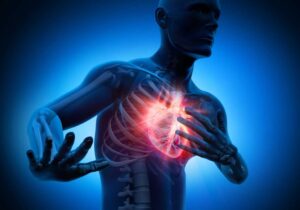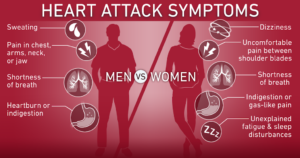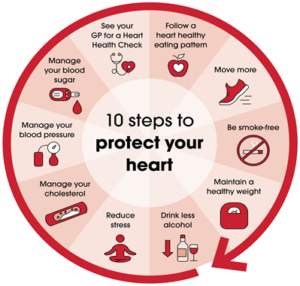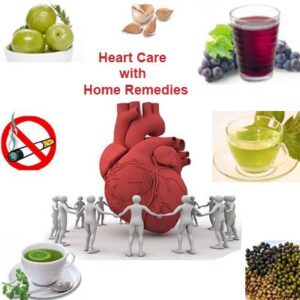Hello Bloggers, Welcome to all of you in Lifelong Health. In this article, we learn about Top Natural and home remedies for heart attack prevention. In Asia, Europe, and the United States, heart disease ranks among the top causes of death. Regrettably, heart disease will worsen as more nations replace their traditional diets with Western lifestyles. Heart and vascular disease-related deaths cause unnecessary deaths to nearly one million people annually in the United States alone. According to a World Health Organization (WHO) report, heart disease and cardiovascular disease claimed the lives of over 17.9 million people in 2019 (1.79 crores). Heart disease and cardiovascular disease cause about 32% of all deaths worldwide each year.
Heart attack and stroke are two of the numerous categories under the umbrella term “cardiovascular.” Of the 7.6 billion people on the planet, over 1 billion have high blood pressure, making it one of the main risk factors for heart disease.
Although heart attacks are the primary cause of death, they can be prevented. Although certain risk factors, like age, gender, or family history, are unavoidable, there are several strategies to prevent heart attacks. These are a few essential actions to think about taking in order to avoid a heart attack.
A heart attack: what is it?
When the blood supply to the heart muscle is cut off or stopped, a heart attack happens. This is frequently brought on by atherosclerosis, a condition in which plaque buildup causes the arteries to narrow. Everything we consume and believe has an equal impact on every part of our body. Our bodies will respond positively to eating healthily and maintaining an optimistic outlook; this will keep us away from serious illnesses like heart attacks and strokes. Stress and unhealthy eating habits raise cholesterol levels in the body, which causes plaque to form. Plaques progressively enter the bloodstream and become lodged in the arteries. This blockage in the arteries is the cause of the heart blockage issue. A heart attack is caused by a blockage in the heart that prevents blood from reaching the heart. We have a heart attack here. The term used in medicine is myocardial infarction (MI).
What signs indicate a heart attack?
Any heart patient who is at risk of having a heart attack may experience the symptoms listed below:
- Chest discomfort and soreness
- shivering (particularly at night)
- discomfort in the jaw, arms, neck, and space between the shoulder blades
- Weariness and lightheadedness
- Light head
- Burning in the heart
- Nausea
- indigestion
- palpitations in the heart
- pressure sensation in the chest
- shortness of breath
- Anxiety
What steps can we take to prevent heart attacks?
Certain lifestyle modifications can help to prevent or even improve heart disease. Anybody looking to improve their heart health can benefit from the following changes. Here are some Natural and home remedies for heart attack prevention.
Engage in regular exercise:
Exercise reduces your risk of heart disease by helping you reach and maintain a healthy weight as well as diabetes, high blood pressure, and elevated cholesterol. Speak with your doctor about any potential activity restrictions if you have a cardiac arrhythmia or defect. Aim for 30 to 60 minutes of physical activity most days of the week, with your doctor’s approval.
Maintain blood pressure control :
Get your blood pressure checked by your healthcare provider at least every two years. If you have a history of heart disease or your blood pressure is higher than normal, he or she might suggest getting measured more frequently. In millimeters of mercury, the ideal blood pressure is less than 120 systolic and 80 diastolic (mm Hg). Excessive levels of cholesterol and blood pressure can damage your heart and blood vessels. If you don’t get tested, you won’t know if you have certain illnesses. Frequent screening can help you determine your statistics and whether you need to take action or take care of them, which can help prevent heart attacks.
Maintain control over your diabetes :
Strict blood sugar management can lower your risk of heart disease if you have diabetes. Consult a diabetic education and care specialist for assistance in preventing health issues . You’ll learn about the most recent developments in diabetes care, as well as receive solutions and support.
Rest well:
Lack of sleep can have negative effects on your health in addition to making you drowsy. Sleep deprivation increases the risk of obesity, hypertension, heart attacks, diabetes, and depression. Most adults need to sleep for at least seven hours every night. Getting enough sleep is important for your well-being. Establish a sleep schedule for yourself and stick to it by waking up and going to bed at the same times every day. This scheduling will help to prevent heart attacks.
Control your stress:
An upsetting situation can set off a series of events. Your body releases adrenaline for a short while, which is a hormone that speeds up your heartbeat, respiration, and blood pressure. These reactions set off the “fight or flight” response, which gets you ready to handle the situation.
Controlling your stress can help you avoid heart attacks and maintain the health of your heart. Thankfully, you can manage your stress by engaging in regular exercise.
Address your depression :
Heart disease can be considerably more likely if you are depressed. If you’re feeling depressed or uninterested in life, talk to your doctor.
Maintain proper hygiene :
To keep yourself healthy, avoid contact with people who have infectious diseases like colds, get vaccinated against the flu, wash your hands frequently, and brush and floss your teeth.
Consume a heart-healthy diet:
A heart-healthy diet can help prevent heart attacks, lower blood pressure, cholesterol, and the risk of developing type 2 diabetes. A meal plan that is heart-diet friendly will include this food item:
- Vegetables and fruits
- legumes—both other legumes and beans—
- Fish and lean meats
- Fat-free or low-fat milk
- Grain (complete)
- healthy fats, such as olive and mustard oils.
Keep your weight in check:
Being overweight increases your risk of heart disease, particularly as you get closer to middle age. Obesity can result in conditions like type 2 diabetes, elevated blood pressure, and elevated cholesterol, all of which increase the risk of heart disease.
A BMI of 25 or higher is considered overweight, and it is associated with increased blood pressure, cholesterol, and heart disease risk. Losing weight can help lower cholesterol, blood sugar, and your risk of developing type 2 diabetes. Here’s how to avoid having a heart attack.
Give up smoking and using tobacco products:
It is well known that tobacco products contain chemicals that are bad for the heart and blood vessels. Because cigarette smoke lowers the amount of oxygen in your blood, your heart has to work harder to pump enough oxygen to your body and brain, which increases blood pressure and heart rate. Nonetheless, there’s some positive news. Your risk of having a heart attack starts to drop as soon as you stop smoking, which can help prevent heart attacks.
After a year without smoking, your heart disease risk drops to about half that of a smoker. No matter how long or how much you smoked, the benefits will begin to show as soon as you give it up.
Handle atrial fibrillation :
An irregular heartbeat called atrial fibrillation leads to the formation of blood clots in the heart. A stroke could then result from those clots moving to the brain. Because atrial fibrillation nearly doubles the risk of stroke, it needs to be treated seriously.
Drugs can assist in lowering risk factors :
There are a few instruments in the “doctor toolbox” of modern medicine that can help lower risk factors. When a person is at risk, medication can be very helpful, particularly if diet, way of life, and supplements are insufficient. Regrettably, many people will only commit to taking their medications on a daily basis. That said, this is a risky tactic. In an effort to lower risk, doctors prescribe blood pressure and cholesterol medications, but leading a healthier lifestyle should also be considered.
Natural Heart Health Remedies to Prevent Heart Attacks :
The following are some quick fixes at home for chest pain brought on by stomach issues or muscle strain:
Garlic
For centuries, garlic has been utilized for its heart-healthy benefits, among other uses. Crushing it releases a substance known as allicin. It’s the reason garlic smells so bad. Researchers believe it maintains arterial elasticity and improves blood flow. The author of 4 Pillars of Health: Heart Disease, David Foreman, RPh, states that there are multiple, well-established studies regarding the beneficial effects of garlic on cardiovascular health. It reduces inflammation, blood pressure, and cholesterol. This combined effect may help lower the chance of strokes and heart attacks.”
Use fresh garlic rather than supplements if you want to benefit from garlic’s health benefits. However, if you have a blood clotting disorder or take blood thinners, consult your doctor first. Garlic may make bleeding more likely.
Almonds
Acid reflux or gastroesophageal reflux disease (GERD) may be the cause of heart pain that happens after eating. Severe chest pain may be a symptom of either condition. Many claim that when heartburn strikes, the symptoms can be relieved by eating a handful of almonds or by drinking almond milk.
This claim is not sufficiently supported by scientific data, and the evidence is anecdotal. Since almonds are an alkaline food, they could theoretically aid in calming and counteracting stomach acid.
Almonds, however, contain a lot of fat. Acid reflux is brought on by fat for certain people. The lower esophageal sphincter may relax as a result of fatty meals, allowing acid to reflux back into the esophagus.
Rice with Red Yeast
Want to reduce cholesterol but don’t want to take medication on a prescription? Boyden suggests this age-old cure, which is made by combining yeast and fermented rice.
Cinnamon
Since ancient times, people have been consuming cinnamon and its health benefits have been acknowledged. One of these characteristics is its ability to effectively lower dangerous cholesterol levels. lowers blood pressure. Studies have shown that incorporating cinnamon into your diet on a daily basis may help avoid heart attacks.
Flaxseed
Here’s another all-natural way to help control your cholesterol. However, you should probably not take it in place of your medication if you’re high risk.
Omega 3 fatty acids, which are abundant in flaxseed, are frequently heart-healthy dietary choices. Omega 3 fatty acids reduce inflammation and blood pressure. Additionally, they contain lignans, which are fiber-rich plant compounds that have been demonstrated to lower cholesterol and plaque accumulation in the arteries.
Select the seeds rather than the oil for the greatest heart-healthy benefits. “The seeds should be ground, milled, and preferably fresh in order to impact health,” According to Foreman. “If not, the whole seed will pass through the body without being digested, like corn, and yield zero health benefits.”
Capsicum
Green bell peppers are high in fiber, which lowers cholesterol, while red bell peppers are high in lycopene, which prevents heart attacks. Elevated homocysteine levels have been linked to a higher risk of heart attacks. Bell peppers are high in folate and vitamin B6, both of which help lower homocysteine levels. Moreover, these vegetables’ strong antioxidants, vitamins A and C, aid in the detoxification of free radicals. Bell peppers are a good source of potassium, which can prevent heart attacks and lower blood pressure by approximately 162 milligrams.
vinegar made from apples
Another natural treatment for acid reflux is to take a tablespoon of apple cider vinegar with a glass of water before meals or whenever you feel heartburn. The claim that apple cider vinegar relieves heartburn is not well supported by scientific research. Yet a lot of people insist that it works.
Not enough acid is produced in the stomach by some people, which causes acid reflux. Because apple cider vinegar increases stomach acid, it might be helpful in this situation. Acetic acid is the substance that gives apple cider vinegar its tang. It might promote healthy digestion and aid in food breakdown.
For most people, apple cider vinegar has no negative effects. If you take blood thinners, you should use caution as it may thin your blood.
Coriander
Throughout the world, coriander is a herb that is used in many different recipes. Blood pressure and low bad cholesterol are two heart disease risk factors. As a diuretic, coriander can lower blood pressure and help prevent heart attacks.
Cayenne Pepper
It facilitates blood flow to all parts of the body. Capsaicin, a substance found in cayenne peppers, may lower blood pressure and prevent heart attacks. A heart that has less blood pressure and more blood flow is a healthier heart.
Arjuna bark
It is a potent cardiovascular and heart tonic. This natural remedy improves coronary artery blood flow circulation, strengthens the cardiac muscles, guards against hypoxic damage to the heart muscle, and helps prevent heart attacks. Arjuna decoction with milk is a popular tonic for the heart. Arjuna bark powder or extract helps lower triglyceride and cholesterol levels.
K2 vitamin
Improved heart health is frequently associated with vitamin K2. A 2014 study found that in individuals who were at high risk for the disease, diets high in vitamin K (think leafy, green veggies) helped lower the risk of death from heart problems.
Turmeric
A golden-yellow spice used in Indian cooking, turmeric is one of the natural treatments for heart attacks. Turmeric is certainly well-known for its health benefits. The curcumin compound in turmeric is responsible for its yellow color. It is also in charge of the medicinal qualities.
Curcumin has anti-inflammatory, anti-bad-cholesterol, and anti-blood-clot properties. It is commonly known that turmeric has health benefits.
Green Tea
Heart attacks rank close to the top among the leading causes of death. A simple home remedy for lowering cholesterol and heart attack and stroke risk is green tea. Green tea has been shown to lower blood levels of bad cholesterol and reduce the risk of heart attacks.
Drinking a hot drink
Gas is a common cause of chest pain. A hot or warm drink may help rev up your digestive system and ease gas and bloating. Hot hibiscus tea, in particular, supports digestion and heart health. Research shows hibiscus helps lower blood pressure and reduces cholesterol and triglycerides. Hibiscus is generally recognized as safe to consume.
Ginger
Spicy ginger is said to possess antioxidant and anti-inflammatory properties.
It might be useful:
- lower the BP
- lower cholesterol levels
- lower the triglycerides
- avoid clotting blood
Ginger has a reputation for easing stomach discomfort and lowering gas. Additionally, it is a natural blood thinner, so if you take prescription blood thinners, stay away from using it.
Basil
One common herb used in Ayurveda is holy basil. It is primarily used to combat stress and shield against illnesses brought on by stress. It lowers cholesterol as well. Blood pressure and cholesterol may rise with prolonged stress. If you use unhealthy coping mechanisms to manage stress, like binge eating or smoking, it may also raise your chance of developing heart disease.
Resveratrol
In the past, resveratrol received a lot of attention, probably because it can be found in two foods that most people enjoy: red wine and chocolate. However, Soffer claims that “the clinical trial results were underwhelming,” which is why he stopped reading about resveratrol supplements for heart health. According to him, “For people with serious risk, it didn’t add much, if any, benefit.”
When to contact emergency services?
Chest pain shouldn’t be treated with over-the-counter medications. If you experience any unusual chest pain, you should see a doctor.
Contact emergency services right away if you have chronic chest pain, whether or not it is accompanied by other symptoms like nausea, shortness of breath, or sweating. That could be a heart attack you’re having.
The signs of a heart attack could get worse quickly. You should wait for the ambulance to come or, in certain cases, have it meet you on the way. Personnel working in emergency services are prepared and skilled to manage more serious medical emergencies that may arise while traveling to a hospital.
You May also Read : The Effects of Sleep Deprivation on Your Body
In summary
Everybody occasionally feels pain near their hearts. The most common causes of heart pain are overworked muscles or digestive issues, but more serious conditions can also occasionally be the cause.
Heart pain should always be taken seriously because it can be challenging to differentiate between angina, a heart attack, and bad gas. I hope these Natural and home remedies for heart attack prevention benefit you.
While there are unproven home remedies, the majority are safe and unlikely to have negative side effects. Pain relief and heart health maintenance may be achieved by combining home remedies with a heart-healthy lifestyle.




1 thought on “Natural and home remedies for heart attack prevention”